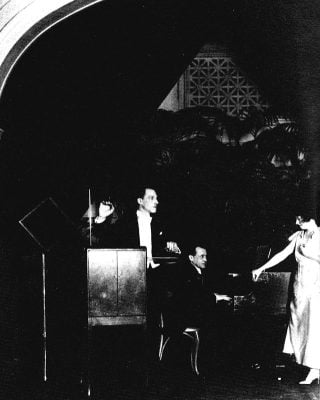Many extraordinary advancements were made thanks to the impact of the October Revolution. And this was especially true in the field of science.
The USSR went on to have more scientists per capita than the major western powers combined. Scientific and technological endeavour became associated with Soviet power.
Amongst the outstanding individuals who advanced technology in the USSR was Lev Sergeyevich Termen, better known today as Leon Theremin – inventor of the eponymous musical instrument.
Theremin
Termen showed a great enthusiasm for science and music at a young age, impressing his classmates with experiments, performances, and inventions.
Like many of his generation though, he was sent to war. And like many of his generation, he came back a revolutionary and a supporter of the Bolsheviks.
After proving himself by heroically dismantling a radio station to stop the advancing, reactionary White Army from declaring victory, he was asked to help run the Physical Technical Institute: part of the Soviet government’s nationalised programme of funding for science, art, and technology.
Whilst working at this institute, Termen developed a high-frequency oscillator that could accurately measure gases, detect motion, and change pitch in response to hand movements in the vicinity of the device.
The invention, later known to the world as the ‘theremin’, produced strange and wonderful sounds – a uniquely eerie and hauntingly high-pitched drone type of timbre.
Although many today may not know of its existence, the distinctive sound of the theremin has certainly left its musical mark.
Since its invention, the theremin has appeared in Shostakovich’s Odna, numerous sci-fi thrillers, the Beach Boys’ critically acclaimed single ‘Good Vibrations’, and most recently the soundtrack of Disney’s Loki.
Freedom
Termen’s invention was applauded by many scientists and thinkers in the Soviet Union, most notably Lenin.

When given the chance to play the instrument himself, Lenin chose to play ‘Skylark’ – apparently with great skill. This paints a vivid picture in remarkable contrast to the dry, uncultured, ‘party man’ that Lenin is often described as by his critics.
In fact, Lenin and the Bolsheviks placed great value in developing the sciences and arts. They attempted to ensure funding to facilitate this, despite the economic backwardness and scarcity that the Soviet Union faced. And they saw the fight for communism as the means of providing true freedom for humanity to create, experiment, and advance.
Sadly, with the degeneration of the Soviet Union, Termen became a pawn in the Stalinist bureaucracy’s game. He was arrested, with his scientific prowess instead directed towards espionage. As part of this, he created an audio device known as ‘The Thing’, which spied on the US ambassador’s office for seven years!
Innovation
Nowadays, it is rare to see advancements in scientific and musical technology like those seen in the early years of the Soviet Union. The invention of the theremin was just one amongst many innovations seen in this field, under the planned economy.
Under capitalism, by contrast, music has become yet another commodity, produced to be profitable. Musical innovation of any kind has been left to suffer under the stranglehold of the profit motive.
Recent studies have found, for example, that since 1955, the timbral variety and pitch content of music has hugely decreased, with label bosses constraining artists’ creativity in order to churn out generic hits for radio and streaming services.
Talent and innovation are being wasted and squandered under capitalism. As Trotsky once remarked: “How many Aristotles are herding swine? And how many swine-herders are sitting on thrones?” Yes, and many Leon Termens are herding swine today?






